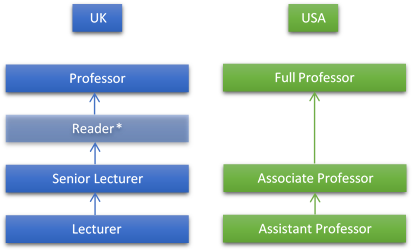What is a Professor?
Bruce Macfarlane, the author of Intellectual Leadership in Higher Education, describes ‘professor’ as ‘a slippery term’. That’s because in the UK it means something quite different from what it denotes in North America. In North America ‘professor’ and ‘professorship’ are generic labels applied to all academics employed to research and teach in universities. In the UK, much of Europe (and, for the most part, in Australasia and South Africa), ‘professorship’ denotes distinction: a professor is someone who has been promoted to the highest academic grade – usually on the basis of her or his scholarly achievements. It’s the equivalent to what, in North America, is known as full professorship.
Some people are unclear about how someone known as ‘Dr’ is different from someone whose title is ‘Professor’. ‘Dr’ denotes someone who has studied for, and been awarded, a PhD, so it denotes an academic qualification: the holder of the highest university degree. It’s the equivalent of writing ‘PhD’ after someone’s name. Most professors will be PhD-holders, but so will be many – if not most – other academics employed as university teachers and researchers. ‘Professor’ doesn’t denote a qualification but an academic staff grade – the most senior one. So, in the UK, an academic whose title is ‘Dr’ is someone who’s got a PhD, but hasn’t been promoted to the highest academic grade, while an academic whose title is ‘Professor’ is someone who probably (but not necessarily) has a PhD, but who has been promoted to the highest grade on the university pay scale. Professorship therefore denotes seniority and status. If we make a comparison with medical doctors working in a hospital, all will have medical degrees, but they are employed at different levels of seniority, with consultants being the most senior doctors. We may think of professors as the equivalent of hospital consultants.
On this website the UK interpretation of ‘professor’, ‘professorship’ and the ‘professoriate’ apply.

Main academic grades in the UK, shown alongside the North American equivalents (* some universities do not use the reader grade).
This diagram represents the core grading system used in most UK universities. Some UK universities have adopted North American nomenclature, but in such contexts the title ‘professor’ remains reserved, for the most part, to denoting only the most senior grade; associate and assistant professors tend not to be referred to or addressed as professors.
Academic grading systems used in the UK’s post-1992 university sector may include additional grades, such as principal lecturer.
How do people get to be professors?
In several European countries – such as France, Germany and, more recently, Italy – an academic who wishes to be promoted to a professorship must first write a lengthy academic document that indicates what contribution s/he has made to knowledge, through her or his research. The document is similar in length and nature to a PhD thesis, and its quality is judged by a panel of professors who are experts in the applicant’s research field. This process of seeking approval from the academic community of one’s academic credentials for professorship is called habilitation. If the panel judges the academic to be worthy of professorship, s/he is then eligible to apply for vacant professorships, but is not guaranteed to be appointed to one.
In the UK promotion to professorship doesn’t depend upon habilitation. Each university has its own policy on promotions at any level, and decides whom it promotes or appoints to professorship, against its own criteria, and academics who wish to be considered for promotion must submit an application that indicates how they meet the university’s criteria. A different route to professorship in the UK involves academics simply applying for any vacant professorships that are advertised, and undergoing the selection process.
What proportion of university academics are professors?
In the UK, around one in ten university academics is a professor. Data provided by the UK’s Higher Education Statistics Agency numbers professors employed in UK higher education institutions in 2015-2016 at 19,975, representing 9.9% of all academic staff. The UK-based professoriate suffers from gender imbalance; of the 19,970 academics who, in 2015-16 were categorised by their institutions as professors, only 4,775 are recorded as female.
